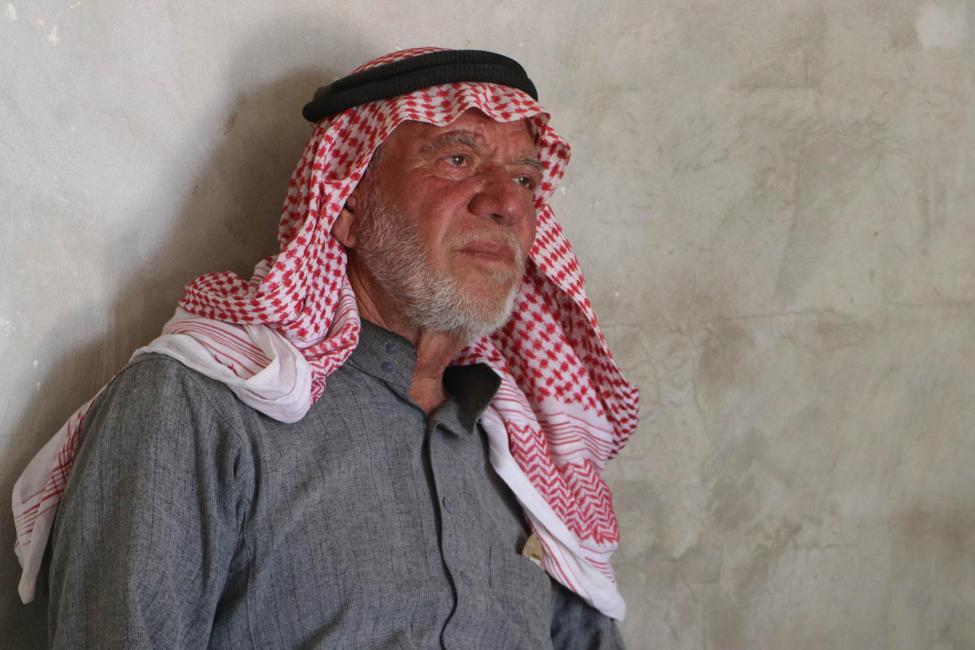-
Who We Are
WHO WE AREThe International Organization for Migration (IOM) is part of the United Nations System as the leading inter-governmental organization promoting humane and orderly migration for the benefit of all. IOM has had a presence in Türkiye since 1991.
About
About
IOM Global
IOM Global
-
Our Work
Our WorkAs the leading inter-governmental organization promoting since 1951 humane and orderly migration, IOM plays a key role to support the achievement of the 2030 Agenda through different areas of intervention that connect both humanitarian assistance and sustainable development. Across Türkiye, IOM addresses the full scope of migration issues, supporting and developing government capacity to manage migration.
Cross-cutting (Global)
Cross-cutting (Global)
- Data and Resources
- Take Action
- 2030 Agenda
Before the war in Syria, Suhib was living a quiet life in rural southern Aleppo. He worked day-to-day on his farm producing cotton, a business he had inherited from his parents.
In 2011, everything changed. The onset of the civil war led to growing instability. Fearing for his life and no longer able to farm, he had no choice but to leave.
This began his journey of displacement, moving from one village to the next and finding little success resuming his agricultural ventures.
Together with his wife and children, he finally settled in a camp in Afrin. Amid a water shortage and lack of basic services, they found themselves living in extremely difficult conditions – magnified by the devastating earthquakes that struck in February 2023.
“Infrastructure in the camp was deteriorating. There were no personal bathrooms, no street lighting,” he described of the site before the earthquakes struck. Harsh rains and winds in the winter and scorching heat in the summer added to the challenges.
Suhib’s story is reflective of what millions of internally displaced persons (IDPs) in Northwest Syria had to go through, first when the conflict broke out, then when the earthquakes struck. Thousands of camps sprung up to host people in need of shelter.
In crisis settings, Camp Coordination and Camp Management (CCCM) work is critical. This involves managing and coordinating assistance, services and protection activities in displacement sites and ensuring the participation of the population in decision-making.
The camp Suhib lives in was one of 56 IDP sites and 5 Reception Centers (RCs) selected by the International Organization for Migration (IOM) to receive support in the earthquakes' aftermath, through funding from the Syria Cross-Border Humanitarian Fund (SCHF). Following an assessment, these sites were selected for hosting people who had lost their homes due to the earthquakes.
IOM coordinated the provision of food, health, protection and other assistance; received and registered residents; and installed and rehabilitated toilets, latrines, water and sewage networks, and lighting poles.
Although conditions remain challenging, Suhib notes significant improvements. “There are now good bathrooms and sanitary facilities. Key infrastructure was renovated, and more services are offered.”
“We also received awareness sessions on diseases, especially cholera,” he adds. Syria has been experiencing a cholera outbreak since September 2022.
Abdul Hadi lives in another camp, after his house was destroyed in 2018.
“We received some essential supplies from humanitarian organizations monthly, but the situation continued to deteriorate. We couldn’t secure drinking water and sewage was leaking,” he recounts of the camp. IOM’s interventions included improvements to water, sanitation and hygiene (WASH) infrastructure.
Training sessions on fire prevention, along with the handover of firefighting equipment, were also crucial. “We witnessed numerous fires break out and didn’t have the means to extinguish them.”
After also being trained in hygiene promotion and camp maintenance, Abdul Hadi now plays an important leadership role in the community, identifying gaps and needs to be addressed.
In 2023, IOM implemented various camp care and maintenance activities, benefiting over 98,000 IDPs in 17,955 households.
“Our CCCM work helps ensure that Syrians can live dignified lives in camps, as we strive toward long-term recovery from the earthquakes,” expresses Muhaned Rubayee, IOM Programme Officer (Transition and Recovery). “With funding for the Syrian crisis expected to decrease in 2024, millions are at risk of not receiving critical support.”
Suhib echoes this sentiment: “Joint efforts by humanitarian organizations make a real difference in the lives of camp residents. Our families can live in better conditions and overcome suffering.”
Abdul Hadi hopes to establish schools in his camp, so that more children can resume their education. Other camp residents request for improved lighting, which helps protect women and girls.
As the impact and memories of last year's tragedy linger, Suhib and Abdul Hadi ask that the world not forget the plight of displaced Syrians.
Written by Miko Alazas, IOM Türkiye Media and Communications Officer


